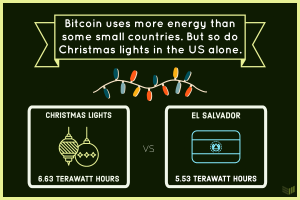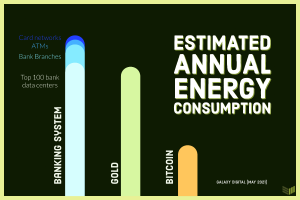21 Days of Bitcoin DAY 15: How Bitcoin Incentivizes Clean Energy Production
Bitcoin Incentivizes Clean Energy Production

The number one complaint I hear about bitcoin is that it’s “bad for the environment.” This has caused a lot of FUD (fear, uncertainty, and doubt) about how positive bitcoin really is.
Now, while it’s easy to get caught up in the many biased Bitcoin articles arguing for or against this statement — typically with cherry picked statistics — here’s the reality: Most of us aren’t environmental experts, but I’ll bet that most of us care about the environment. Let’s look at this logically and put things into perspective.
Yes, Bitcoin requires a lot of energy to operate. Yes, some of our energy sources are unclean and bad for the environment. And yes, the Bitcoin network is a “waste” of energy — just like everything that requires energy is a “waste” of energy, depending on your perspective.

To many environmentalists, your modern appliances and big-city living habits are unspeakably hedonistic carbon footprint culprits. To others, energy usage for modern necessities isn’t so distressing. The same goes for Bitcoin: If you think it’s a useless fake internet money with no inherent value, then you’d question why we spend any energy on it at all.
As the numbers continue to change and all energy production leans towards clean, renewable sources, I’ll help paint a general picture for why we shouldn’t be too cynical. Bitcoin should not be scapegoated with “destroying the environment,” and here’s why.
Bitcoin Mining Incentivizes Clean Energy Production
To start, let’s consider this concept: Bitcoin works because every participant in the Bitcoin network is acting selfishly. The network is setup so that as long as we continue to act selfishly, we are also supporting the security and structure of the network as a whole (this was covered previously when we talked about how bitcoin is “unhackable”).
For miners, this means finding the cheapest long-term electricity in order to confirm transactions and receive new bitcoin rewards. It just so happens that clean, renewable energy is the cheapest, most sustainable source of power, while environmentally damaging fossil fuels are the most unsustainable. After all, the sun keeps shining and the winds keep blowing, but coal doesn’t burn unless we throw it in the furnace.
As such, bitcoin mining incentivizes a transition toward a 100% renewable, clean energy future.
Unfortunately, we currently don’t have the technology to store or transport clean power very well. This makes it so that tons of clean energy is curtailed and gone to waste, simply because we don’t have the ability to use it efficiently.
Here’s how bitcoin mining efficiently uses this wasted power.
Excess Regional Power
Take a look at the hydropower situation in Sichuan, China. When bitcoin mining was banned in China in early 2021, Sichuan was a lagging enforcer, allowing miners until September to withdraw from the province. This is due to the fact that in the summer, Sichuan has ample natural hydropower, but no means to utilize or store the excess energy produced. As much as three times the amount of normal power is produced during the summer, but power usage from ACs only increases by 30%. Thus, bitcoin mining uniquely allows Sichuan to not waste excess energy.
While unfortunate that mining has been banned in China now, similar circumstances play out worldwide where excess clean power is produced.

How Bitcoin Uses Energy
Contrary to popular belief, bitcoin transactions are not directly proportional to energy usage. In fact, it’s flawed to claim that bitcoin has a “per-transaction energy usage” at all. Transactions are batched into blocks at limited quantities due to the block size, and more transactions per block doesn’t mean more energy usage.
Lyn Alden proposes a great analogy: Imagine bitcoin block confirmations like running your dishwasher. No matter if your dishwasher is half full or completely full, it takes the same amount of water and energy to run every night. The same goes for bitcoin.
Your single transaction doesn’t marginally affect bitcoin’s energy usage, so you shouldn’t be guilted into not making a transaction just because a misinformed journalist told you your single bitcoin transaction could have powered 24 days of your household electricity.
Rather, a bulk of bitcoin’s energy usage comes from miners using proof of work to earn block rewards. Though it may seem like a “waste of energy” that so many miners spend so much energy just for only one miner to “win” a block, it ensures the security of the Bitcoin network, and I’d say that warrants bitcoin’s energy usage a place in this world — well, at least as much as your Christmas lights do.
On a mission to figure out what is up with all the bitcoin energy FUD? Tweet your concerns and questions with #21DaysofBitcoin